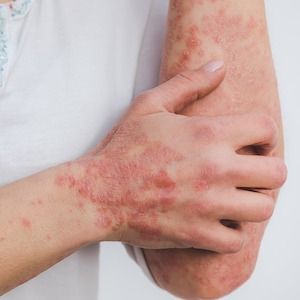No Difference in Psoriasis Immune Response Despite Switch Between AVT02, Adalimumab
These data were found to be consistent with the findings in the main study, the contents of which suggested the treatments’ interchangeability.

There is a high level of similarity in ex-vivo cellular immune responses among moderate-to-severe chronic plaque psoriasis patients, regardless of exclusively receiving reference product adalimumab (Humira) or switching between adalimumab and AVT02, according to new findings.1
These findings represent the conclusion of an analysis of ex vivo exploratory data drawn from a comparative clinical trial. The trial had been conducted to look into the interchangeability between monoclonal antibody AVT02 and the reference product.
This was led by Kathleen Richter, from Alvotech Germany GmbH in Jülich, Germany. Richter and colleagues noted the prior confirmation of AVT02’s biosimilarity to adalimumab in a pharmacokinetic study and then in follow-up research confirming safety and efficacy.2,3
“The aim was to compare the cell-mediated immunogenicity in participants with moderate-to-severe chronic plaque psoriasis in the AVT02-GL-302 study who received either the RP alone or switched between the RPand AVT02 after ex vivo exposure of isolated PBMCs with the reference product, AVT02, or Keyhole limpet hemocyanin (KLH), using the novel ex vivo comparative immunogenicity assessment (EVCIA),” Richter and colleagues wrote.
Background and Findings
During the AVT02-GL-302 study, the investigators carried out an ex vivo comparative immunogenicity assessment (EVCIA) to determine cellular immunogenicity among subjects of the study that had chronic cases of psoriasis. The subjects were randomly assigned using a 1:1 ratio by week 12 to be part of the ‘non-switching’ cohort (given the reference product) or the switching cohort (alternating between adalimumab and AVT02).
The research team gathered peripheral blood mononuclear cells (PBMCs) and they cryopreserved the cells at the week 1 point of baseline, at the week 12 pre-randomization period, and at weeks 16 and 28 among both cohorts. By the time the team began thawing, the cells were re-exposed to several different types of stimuli, some of which included medium alone (negative control), AVT02, reference product, keyhole limpet hemocyanin (KLH) (positive control), RP+KLH, or AVT02+KLH.
The investigators then assessed cytokine release and Th-cell proliferation through the samples collected from 10 subjects per arm. The team thereby ensured a predetermined average cell viability of 75% over all of the different points in time.
The research team found that the cytokine release and Th-cell proliferation continued to be comparable at each of the different points in time between the group that switched and the group that did not switch until the 28-week mark. A notable finding was that in all time points, the overall cellular immune response ended up being heightened post-KLH re-exposure.
This research, which had been derived from the AVT02-GL-302 study, was shown by the team to have reinforced the confirmation of interchangeability seen in the main trial. This may allow for helpful data on the effects of switching treatments on patients’ cellular immunogenicity.
The innovative EVCIA methodology employed by the investigators in their research here may provide a distinct assessment of both qualitative and quantitative shifts occurring in the cellular immunogenic response caused by switching conditions in vivo.
“Initial cellular response could be a valuable additional outcome to predict overall immune response to biologic medicines, currently typically measured by the later development of ADAs and Nabs,” they concluded.
The investigators also noted the importance of interpreting the results and considering the research limitations. They noted that the rapid treatment of blood samples was important due to EVCIA sensitivity, adding that delays could impact cell responses and data quality.
In addition, the research team acknowledged that additional confirmation may be needed as the study’s small sample sizes and analysis do not have the same needs as larger, prospective, randomized clinical trials.
References
- Kathleen Richter, Halimu N Haliduola, Jana Schockaert, Aurélie Mazy, Nataliya Reznichenko, Eric Guenzi, Fausto Berti, Ex vivo comparative immunogenicity assessment (EVCIA) to determine relative immunogenicity in chronic plaque psoriasis in participants receiving Humira® or undergoing repeated switches between Humira® and AVT02, Immunotherapy Advances, Volume 4, Issue 1, 2024, ltad029, https://doi.org/10.1093/immadv/ltad029.
- Feldman SR, Reznichenko N, Pulka G et al. . Efficacy, safety and immunogenicity of AVT02 versus originator adalimumab in subjects with moderate to severe chronic plaque psoriasis: a multicentre, double-blind, randomised, parallel group, active control, phase III study. BioDrugs 2021; 35(6):735–48. https://doi.org/10.1007/s40259-021-00502-w.
- Feldman S. 0139: a clinical study designed to support a demonstration of interchangeability between AVT02 and reference adalimumab (Humira®). In: Session: (0123–0149) Miscellaneous Rheumatic and Inflammatory Diseases Poster I. American College of Rheumatology (ACR), 2022. https://www.eventscribe.net/2022/ACRConvergence/fsPopup.asp?Mode=presInfo&PresentationID=1128607 (16 March 2023, date last accessed).